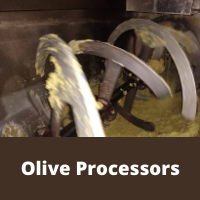Olive and grape waste-derived extracts showed better anti-microbial activity against a bacteria and yeast than three synthetic antioxidants, according to a new study.
A report in the journal Innovative Food Science and Emerging Technologies (17 November 2007) said a study showed that waste-derived extracts from olive oil and wine production, performed better against pathogens such as E. coli and Salmonella than three standard antioxidants.
This has raised hopes about the potential as food preservatives of these natural extracts from olives and grapes.
“From results presented, we can assume that the natural extracts grape extract and olive extract are promising natural preservatives, with application in food industry,” wrote lead author Ana Teresa Serra from Portugal’s Instituto de Biologia Experimental e Tecnológica (IBET/ITQB-UNL).
Serra and co-workers tested the olive and grape residue extracts against five microbial species (E.coli, S.poona, B.cereus, S. cerevisiae and C.albicans).
They report that the grape extract contained high levels of phenolic compounds, with 3400 milligram of gallic acid equivalents per litre (GAE/L), compared to 400mgGAE/L in the olive extract.
Olive extracts, and synthetic hydroxytyrosol and oleuropein, performed less effectively than the grape extract, but against two yeast strains of S.cerevisiae and C.albicans, both extracts showed significant inhibition in a dose-dependent manner.
“The action of the synthetic antioxidants alone was much less effective than natural extracts,” Serra wrote.
The research taps into an ever-growing body of study seeking natural alternatives to synthetic preservatives to slow down the oxidative deterioration of food.
The label ‘natural’ is a powerful force in the food industry, and there is increasing resistance at regulatory and consumer level – as well as from food retailers and manufacturers aiming to meet their demands – to synthetic preservatives.
The researchers note that, in addition to the ‘natural’ tag, the extracts can be cheap sources since they come from olive oil and wine production wastes.
According to a 2003 report by Frost and Sullivan, the synthetic antioxidant market is in decline, while natural antioxidants, such as herb extracts, tocopherols (vitamin E) and ascorbates (vitamin C) are growing, pushed by easier consumer acceptance and legal requirements for market access.




